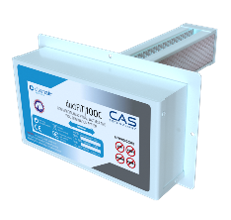Worries Over Indoor Air Quality Fester During Pandemic, Finds New Research

Survey by CleanAir Spaces details public’s concerns over virus spread in indoor environments and hospitality venues
- Majority (56 per cent) of Brits have become more concerned by indoor air quality since the arrival of the pandemic
- More than half (53 per cent) recognise that air quality inside pubs and restaurants could increase their chance of catching COVID-19
- Nearly half of consumers would rely on an air quality rating to feel comfortable dining out
As bars, restaurants, non-essential retail and workplaces continue to await the opportunity to welcome back customers and employees following the announcement of the third national lockdown, new research reveals that UK consumers are increasingly anxious about the impact of indoor air quality on their chances of contracting the virus. According to a survey commissioned by CleanAir Spaces, the majority (56 per cent) of Brits think more about indoor air quality than before the pandemic hit.
While millions of people had been temporarily welcomed back by the hospitality sector (with or without a substantial meal) prior to the new restrictions, less than a quarter (24 per cent) believe that the air quality inside pubs and restaurants does not increase their chances of contracting COVID-19. In fact, more than half (53 per cent) are confident that the air quality inside venues does impact their chances of catching the virus.
However, perhaps illustrative of the Government’s challenges in communicating the science around COVID-19, nearly a quarter (23 per cent) of UK consumers don’t know whether air quality in venues would increase their risk.
The findings, based on a nationally representative survey of n=2085 adults throughout the UK conducted by polling company, ORB International, suggest that businesses have a lot to do to make visitors feel safe within their environments, but also offer an indication on how they can answer those concerns. Nearly half of respondents (47 per cent) said that an air quality rating system would help them to choose one venue over another.
“People will be finding it doubly hard at this time of year not to be able to socialise as normal, but the research shows that concerns about stepping into pubs, restaurants and other indoor spaces remain high,” said Pablo Fernandez, CEO of CleanAir Spaces. “Even with vaccines beginning to roll out before the New Year, this wariness will take some time to dispel and businesses will need to think hard about how they can instil confidence in patrons and employees alike.”
The findings suggest that women in general are more concerned about indoor air quality than men, with more female respondents (59 per cent versus 54 per cent) reporting that they are thinking more about indoor air quality. Male respondents were also more dismissive of the link between air quality in venues and an increased chance of contracting COVID-19 (28 per cent of men versus 21 per cent of women).
Unsurprisingly, based on the skewed impacts of the disease, fewer younger respondents reported experiencing increased anxiety about indoor air quality, than older: 48 per cent of 18-24 year olds agreeing it was playing on their mind more, versus 60 per cent of the over 65s. Differences in regional attitudes were also apparent with Northern Ireland having 74 per cent of people more concerned (although note the low base size of n=61), compared with just 44 per cent in the North East. Similarly, the North East had the highest percentage (35 per cent) of respondents believing that air quality inside pubs and restaurants wouldn’t increase their chances of catching COVID-19, compared with just 19 per cent in Scotland and 17 per cent in Northern Ireland, where concerns are clearly higher.
 CleanAir Spaces’ technology is being brought to market in the UK by BioTech Group. The system treats indoor air with water vapour and hydrogen peroxide forming ions that circulate the air within this space. These ions cover surfaces and affect the lipid membranes of virus cells. This results in the cells becoming inactive and losing their infectious capacity, leading to a lowering the viral load in an indoor space. It is proven to remove more than 99.9% of viruses and bacteria in air and on surfaces. It provides continuous disinfection of surfaces for 24 hours a day, 7 days a week - drastically reducing harmful microparticles.
CleanAir Spaces’ technology is being brought to market in the UK by BioTech Group. The system treats indoor air with water vapour and hydrogen peroxide forming ions that circulate the air within this space. These ions cover surfaces and affect the lipid membranes of virus cells. This results in the cells becoming inactive and losing their infectious capacity, leading to a lowering the viral load in an indoor space. It is proven to remove more than 99.9% of viruses and bacteria in air and on surfaces. It provides continuous disinfection of surfaces for 24 hours a day, 7 days a week - drastically reducing harmful microparticles.
Steven Skerrett, Director of BioTech Group, added, “we have noticed in our discussions with industry leaders across the UK that there is a far greater focus on indoor air quality post-COVID-19. There is appetite now to change our indoor gathering spaces for the safety and health of all and it is important that the country seizes that opportunity as we come out of the other side of this pandemic.”










































